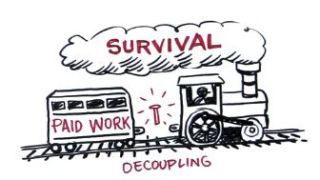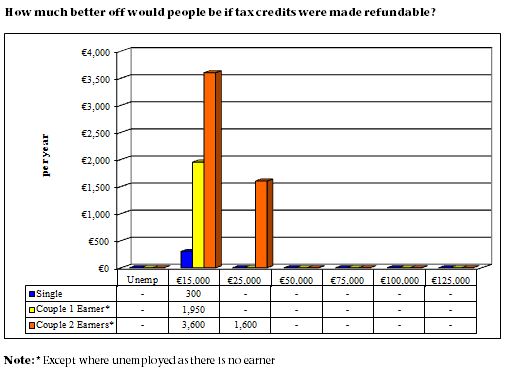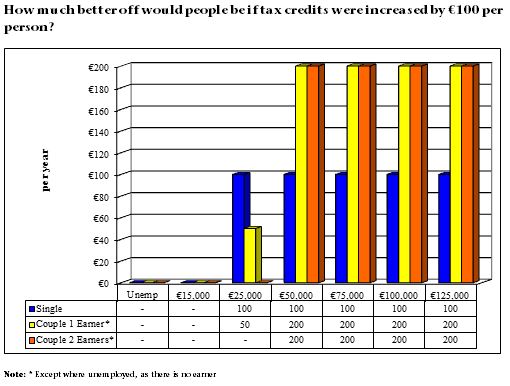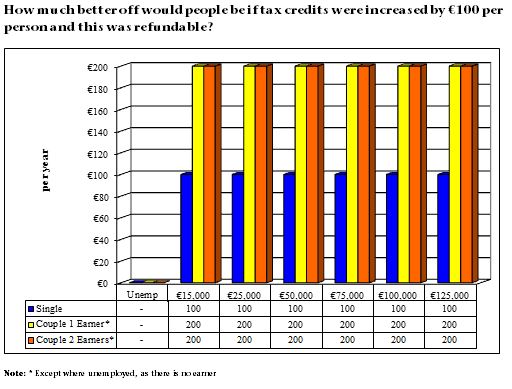Refundable Tax Credits are key to dealing with the issue of Low Pay

Last Friday, Social Justice Ireland made our submission to the Low Pay Commission as part of the consultation process on the National Minimum Wage (NMW).
Even after the 30 cents per hour increase that became effective on January 1st, the NMW (€9.55 per hour) is almost 20 per cent below the level of the Living Wage of €11.70 per hour. The Living Wage is the amount of money a person must earn per hour in order to achieve a minimum socially acceptable standard of living whilst working 39 hours per week. (Social Justice Ireland is part of the Living Wage Technical Group, which calculates the Living Wage annually. You can read more about the LIving Wage here).
In order to properly tackle the issue of Low Pay in the Irish economy, we believe that government should:
- restore the policy of keeping the NMW fully outside the tax net;
- seek to ensure that new jobs have reasonable pay rates and reduce the instance of zero-hours contracts and other working conditions of a precarious nature;
- give consideration to the role that the Living Wage can play in informing the level of the NMW;
- commit to a timeframe over which the NMW would move towards the rate of the Living Wage.
There is one other key policy that we believe government should pursue as part of the process of addressing the working poor issue: Government should make personal income tax credits refundable. This would make Ireland’s tax system fairer, address part of the working poor problem, and improve the living standards of a substantial number of people in Ireland.
Introducing Refundable Tax Credits
The move from tax allowances to tax credits was completed in Budget 2001. This was a very welcome change because it put in place a system that had been advocated for a long time by a range of groups. One problem persists, however. If a low income worker does not earn enough to use up his or her full allocation of tax credits then he or she will not benefit from any income tax reductions introduced by government in its annual budget via increases to the PAYE or Personal tax credits.
Making tax credits refundable would be a simple solution to this problem. It would mean that the part of the tax credit that an employee did not benefit from would be “refunded” (essentially paid, at the end of the tax year) to him/her by the Revenue Commissioners. The major advantage of making tax credits refundable lies in addressing the disincentives currently associated with low-paid employment. The main beneficiaries of refundable tax credits would be low-paid employees (both full-time and part-time). The chart below displays the impacts of the introduction of this policy across various gross income levels. It clearly shows that all of the benefits from introducing this policy would go directly to those on the lowest incomes.

Most people with regular incomes and jobs would not receive any cash refund because their incomes are too high. They would simply benefit from any increase to tax credits via a reduction in their tax bill. Therefore, as the above chart shows, no change is proposed for these people. For other people on low or irregular incomes, the refundable tax credit could be paid via a refund by the Revenue Commissioners at the end of the tax year. Following the introduction of refundable tax credits, all subsequent increases in the level of the tax credit would be of equal value to all employees.
To illustrate the benefits of this approach, the charts below compare the effects of a €100 increase in the personal tax credit before and after the introduction of refundable tax credits. The first shows the effect as the system is currently structured – an increase of €100 in credits, but these are not refundable. It shows that the gains are allocated equally to all categories of earners above €50,000. However, there is no benefit for those workers whose earnings are not in the tax net.
The second chart shows how the benefits of a €100 a year increase in personal tax credits would be distributed under a system of refundable tax credits. This simulation demonstrates the equity attached to using the tax-credit instrument to distribute budgetary taxation changes. The benefit to all categories of income earners (single/couple, one-earner/couple, dual-earners) is the same. Consequently, in relative terms, those earners at the bottom of the distribution do best.


Overall the merits of adopting this approach are: that every beneficiary of tax credits would receive the full value of the tax credit; that the system would improve the net income of the workers whose incomes are lowest, at modest cost; and that there would be no additional administrative burden placed on employers.
In 2010 Social Justice Ireland published a detailed study on the subject of refundable tax credits. Entitled Building a Fairer Tax System: The Working Poor and the Cost of Refundable Tax Credits, the study identified that the proposed system would benefit 113,000 low-income individuals in an efficient and cost-effective manner. When children and other adults in the household are taken into account the total number of beneficiaries would be 240,000. The cost of making this change would be €140m. The Social Justice Ireland proposal to make tax credits refundable would make Ireland’s tax system fairer, address part of the working poor problem, and improve the living standards of a substantial number of people in Ireland. The following is a summary of that proposal:
Making tax credits refundable: the benefits
- Would address the problem identified already in a straightforward and cost-effective manner.
- No administrative cost to the employer.
- Would incentivise employment over welfare as it would widen the gap between pay and welfare rates.
- Would be more appropriate for a 21st century system of tax and welfare.
Details of Social Justice Ireland proposal
- Unused portion of the Personal and PAYE tax credit (and only these) would be refunded.
- Eligibility criteria is applied to the relevant tax year.
- Individuals must have unused personal and/or PAYE tax credits (by definition).
- Individuals must have been in paid employment.
- Individuals must be at least 23 years of age.
- Individuals must have earned a minimum annual income from employment of €4,000.
- Individuals must have accrued a minimum of 40 PRSI weeks.
- Individuals must not have earned an annual total income greater than €16,500.
- Married couples must not have earned a combined annual total income greater than €33,000.
- Payments would be made at the end of the tax year.
Cost of implementing the proposal
The total cost of refunding unused tax credits to individuals satisfying all of the criteria mentioned in this proposal is estimated at €140m.
Major findings
- At the time of the study, it was estimated that:
- Almost 113,300 low income individuals would receive a refund and would see their disposable income increase as a result of the proposal.
- The majority of the refunds would be worth under €2,400 per annum, or €46 per week, with the most common value being individuals receiving a refund of between €800 to €1,000 per annum, or €15 to €19 per week.
- Considering that the individuals receiving these payments have incomes of less than €16,500 (or €317 per week), such payments are significant to them.
- Almost 40 per cent of refunds would flow to people in low-income working poor households who live below the poverty line.
- A total of 91,056 men, women and children below the poverty threshold would benefit either directly through a payment to themselves or indirectly through a payment to their household from a refundable tax credit.
- Of the 91,056 individuals living below the poverty line that benefit from refunds, most, over 71 per cent receive refunds of more than €10 per week with 32 per cent receiving in excess of €20 per week.
- A total of 148,863 men, women and children above the poverty line would benefit from refundable tax credits either directly through a payment to themselves or indirectly (through a payment to their household. Most of these beneficiaries have income less than €120 per week above the poverty line.
- Some 240,000 individuals overall, all of whom are living in low-income households, would experience an increase in income as a result of the introduction of refundable tax credits.
Once adopted, a system of refundable tax credits as proposed in this study would result in all future changes in tax credits being equally experienced by all employees in Irish society. Such a reform would mark a significant step in the direction of building a fairer taxation system and represent a fairer way for Irish society to allocate its resources.
More information about Refundable Tax Credits can be found in our full submission to the Low Paul Commission. You can read the full version here.